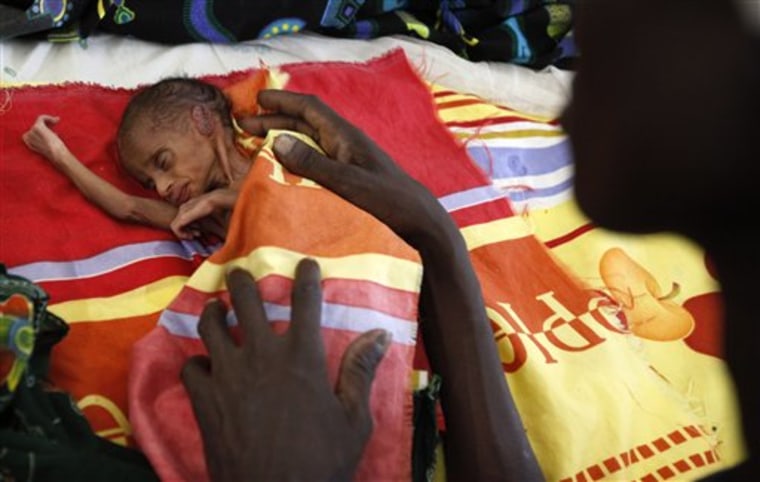Three-day-old Odong Obong lay in the hospital bed, his pencil-thin arms almost motionless and his shriveled, gaunt face resembling that of an elderly man.
Emaciated babies and young children throughout the ward bore the signs of hunger: exposed ribs and distended stomachs. Outside, old villagers reclined motionless in the shade, too frail to walk.
The U.N. calls this the "hungriest place on Earth" after years of drought and conflict, with aid agencies already feeding 80,000 people here. A doctor says the worst is yet to come.
Two years of failed rains and tribal clashes have laid the foundation for Africa's newest humanitarian crisis. The World Food Program quadrupled its assistance levels from January to March in the Akobo region of southeastern Sudan.
International aid agencies are bracing for the worst. Even if spring rains materialize this year, the harvest won't come in until fall.
"And if there is no rain, it will get worse," said Dr. Galiek Galou, one of three doctors at the hospital in this town on the border with Ethiopia.
"If you stay here for a week you'll have problems, even if you have money," he said. "There is nothing to buy."
Southern Sudan lies in a drought-prone belt of Africa, but the situation has been exacerbated by rising intertribal violence that claimed more than 2,000 lives in 2009. Because of the global financial meltdown, the government has fewer available resources.
The food crisis is also a legacy of a devastating north-south civil war of more than 21 years that left 2 million people dead and many more displaced. That conflict is separate from the war in the western Sudanese region of Darfur, which began in 2003 and has killed 300,000.
Hundreds of severely malnourished children
The aid groups Save the Children and Medair have canvassed the Akobo community for the past week, searching for the hungriest children. They found 253 who they classified as severely malnourished, meaning they will die without immediate intervention. The children are enrolled in a feeding program that relies primarily on fortified peanut butter.
Another 200 severely malnourished children are being fed in a separate program, said the U.N.'s Dr. Natalie Lewin.
At the hospital, one toddler who appears to be in the worst shape is 2-year-old Dhoah Thoan, whose skin hangs off his body in an alarming way. He has skinny arms and an oversize stomach but bright brown eyes. Two beds over is Nyagod Kuel, also 2. If he had not been brought in for treatment, he would have died, Galou said.
Nearby, Odong lies on colorful blankets under mosquito netting with his triplet brothers Opiew and Ochan. Their mother hovers at the side of the bed.
"The hunger situation is really bad," said Goi Juoyul Yol, 37, the town's top official, who graduated from the University of Kentucky. "You'll have a cup of grain for a family of five for two days."
A recent survey by Save the Children and Medair found that almost 46 percent of children in the region are malnourished. Lise Grande, the top U.N. official in southern Sudan, labeled the Akobo region as the "hungriest place on Earth." She noted that most humanitarian agencies regard a malnutrition rate of 15 percent to be an emergency threshold.
"This year 4.3 million people in southern Sudan will need some sort of food assistance," Grande said. "That could be as much as nearly half of the population in the south. When you have that many people who need food, you can see the dimensions of the crisis."
Sitting outside one of the hundreds of grass huts that have popped up in recent months as people flee violence and search for food was Kalang Nyot, 32. The mother of five said she walks for 12 hours three times a week to gather a small orange fruit called lalif. A grandmother stays behind and watches the children, but because she is so weak she can barely move.
Danger of migration to city
Mohamed Nuh, an emergency program manager with Save the Children, said aid agencies will need to shift food out of Akobo because families are moving into the town center and away from farmland where they could plant crops, a situation that could begin a cycle of unending need.
"While they're here they just sleep and wait for the food distribution," he said. "The current strategy is not working."
But Akobo's town center showed one of the dangers of moving food away from a central area of accountability.
Among the wooden shops, one salesman had 60 bags of sorghum — a type of grain — for sale donated by the United States. The American flag and "USAID" are stamped on the bags, along with the words "Not to be sold or exchanged." But Deng Bichiaki was indeed selling them — food aid that was likely stolen for the black market.
"Our governments do not intend this to be sold. I must say I've never seen so many bags on one occasion," said Morten Petersen, a technical assistant to the European Commission who was visiting Akobo to see how much aid was needed.
Despite the apparent fraud, Petersen said he would report back that Akobo was suffering "a very severe problem that we will have to confront in coming weeks."
The town is part of an isolated region suffering from tribal warfare that has displaced almost 400,000 people.
Sudan's elections start April 13 and will include local as well as parliamentary and presidential polls in a three-day balloting. The vote is a crucial step in Sudan's 2005 north-south peace deal that ended the civil war and paves the way for a referendum that will allow southerners to decide whether to secede from the Muslim-dominated north.
